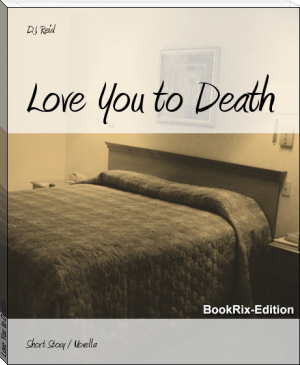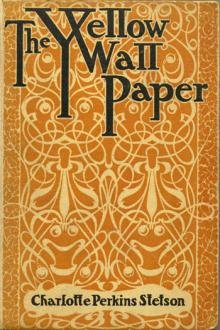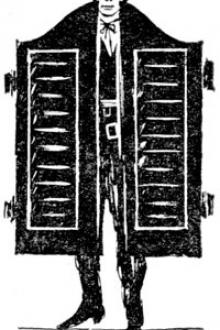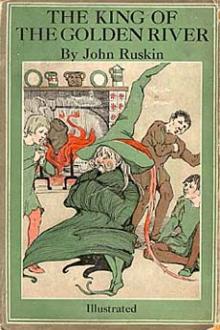Love You to Death, D.J. Reid [books to read this summer txt] 📗

- Author: D.J. Reid
Book online «Love You to Death, D.J. Reid [books to read this summer txt] 📗». Author D.J. Reid
1
They had removed the woman’s body. The ambulance was pulling away as I crunched through the old snow up to the front door of the Forties bungalow. A patrolman in the doorway stood aside and said, “Go on in, Professor Samuels.” I’d seen him before but I couldn’t place his name. Good looking, blond if the hair that showed under his uniform cap was any indication. Buck-something maybe. Buckman? Buckley?
Inside, standing in a dimly lit bedroom, I was glad that I arrived when I did. The bloody smear down the wall where the victim had slumped was still fresh. Maybe not damp. But fresh enough to give my stomach a twitch. I didn’t need a body present to make matters worse.
I stood looking at the ruined wallpaper and let the silence settle around me. I should say around us. Detective Foster Newkirk was standing next to me. The bloody smear started about five feet above the baseboard and ran down about two feet to a larger spatter of red. I imagined the woman’s bloody head tracing the course as she slid down the wall. Dead before she hit the floor, I suspected. But there was something odd about the smear, something I couldn’t put my finger on yet. Like a name that’s on the tip of the tongue but just that far out of memory’s reach.
“It’s wrong, isn’t it?” I said.
The detective sucked his lower lip. “Yeah, but damned if I can put my finger on why.”
“So you phone up a history professor to guide your hand?”
“Don’t be cute, Brian. You know you’re good at figuring out stuff.”
Foster and I had known each other since grade school.
“I have a colleague who’s good at the Times
crossword, too. A real whiz. I don’t see you calling him up.”
“Maybe later. If you bomb.”
“Thanks.” I looked at the blood smear some more, then took a minute to scan the room. A typical bedroom in a typical house.
“You have to admit this is a far cry from murder in ancient Rome,” I said.
I should explain that I teach history at Guilford University. But everyone knows that my sideline is writing mystery novels set in the Roman Empire — three to date. I prefer to use my detective skills, such as they are, in fiction.
There wasn’t much else of interest in the bedroom, so Foster and I just stared at the blood-stained bedroom wall and shoved our hands deeper into our overcoat pockets even though the room was overheated. Death put a chill in the air.
“Could the victim might have been dying, or even dead, before the gunshot?” I asked.
“You think?”
“It’s an idea.”
“I wonder if forensics can tell.”
The professor and the detective. We were both in our 30’s and I like to think still boyish in our own way. I ran my fingers through a shock of sandy hair as unruly as it had been when I was a kid. Of course it didn’t help that Foster had phoned at six, which coincided with the ringing of my alarm clock, and I’d just thrown on some clothes and raced over. Most people would say we were hometown boys made good. Foster, well, he was thicker than he had been as a teen, but he still had a smooth face, dense dark hair, and heavy eyebrows over nearly black eyes.
He was expounding. “Trish Vanderark is the suicide. If it is suicide,” he qualified. “Young blond woman, part-time student,” he said. “Darla Hoffman is the distraught housemate. Quite a bit older. Says she probably drove Trish to it. ‘Loved her to death’ was the phrase she used.”
“Were they a couple?” I asked.
“Yeah, been together a year or so. In this house at least.
According to a neighbor. Maybe they were together before that. You know them?”
“No. Why?”
“You know,” he shrugged.
“Lesbians,” I pointed out, “actually have more in common with straight men than with gay men, Foster.”
He pondered that. “Makes sense, I suppose.”
“Darla Hoffman still here?”
“At a friend’s place. I’ve got a woman officer keeping an eye on her.”
“Okay, well you got me out her at the crack of dawn, so give me the run down,” I said.
“Let’s go sit in the living room, Brian.”
2
I folded my lanky frame into an overstuffed chair with a tired cushion that seemed to rest on the floor, while Foster straddled a sofa arm. There wasn’t much to his account. A middle-aged neighbor, Stanley Wodz, heard the women arguing in the night.
“Which way does he live?”
Foster pointed. “His bedroom faces the one where we found her.”
I nodded for him to continue.
“Apparently, the argument went on for about an hour,” said Foster. “It was right around midnight, according to Wodz, when the shouting stopped. He went to bed. Half an hour later, just as he was dozing off, he heard what sounded like a gunshot. He got up and raised a window.”
“Why’d he do that?”
“Curious, I suppose.”
“Someone starts shooting in my neighborhood, I’m going to get on the floor and stay there, not stick my head out the window.”
“Maybe Wodz isn’t as bright as you are,” commented Foster.
“Anyway, he says he waited several minutes, peering over here. Then, while he was still looking out the window, trying to see if anything was going on, he says, he heard a crash.”
“He actually see anything?”
“Nah, says the shade was down. He was just looking, maybe thinking he’d see a shadow or something. You know how people do that.”
“Yeah.”
“The crash was probably Darla Hoffman breaking down the bedroom door. Wodz didn’t say that, but that’s likely what it was. He just heard a crash of some sort.”
“She strong enough to do that?”
“Built like a linebacker.”
Curious how often stereotypes turn out to be true.
“Anyway,” Foster continued. “Wodz figured something bad had happened, picked up the phone, and called 911. According to the 911 operator, a call from Hoffman came in a couple of minutes after the call from Wodz.”
“The neighbor called first?”
“Right. But the calls weren’t far apart.”
I looked around the living room. Cozy, if you went in for second-hand furniture and bare walls. The place itself wasn’t bad for a rental though, considering. Wood floors. Fireplace looked unused, except for some old soot. Chimney probably needed cleaning. Not a lot of personal items. No knickknacks. Maybe the women hadn’t been together long enough to collect any. Or maybe they weren’t the type to go in for knickknacks.
A lamp had been knocked over.
“That happen during the argument?”
Foster riffled the pages of his notepad. “According to Officer Buckley’s report” — Buckley, that was his name — “Hoffman and Vanderark scuffled and the lamp got broken.”
“What was Darla Hoffman doing when the police arrived?”
“Buckley says she was sitting on the floor next to the body crying her eyes out.”
“Front door unlocked?”
“Hoffman apparently unlocked it after she called 911. The floor was wet.”
“Huh?”
“Hoffman told Buckley that she was in the shower when she heard the gunshot. The door between the bedroom and the bathroom was locked on the bedroom side. The door into the bedroom from the hall also was locked. So she broke down the hall door and found Trish Vanderark slumped against the wall. The gun was still in Vanderark’s hand.”
“How’d she do it?”
“Vanderark?”
“Yeah.”
“According to the medical examiner, looks like she put the gun in her mouth and pulled the trigger. Pretty butch, huh?”
I shrugged. How would I know?
“Gun kept in the bedroom?” I asked.
“Drawer of the nightstand. It was Darla Hoffman’s revolver. Registered. Nothing wrong there.”
“Convenient.” I drew in a breath and blew out. “Locked room murder?”
“That’s where I’m going with this, Brian. Question is: How’d Hoffman do it?”
“If she did.”
“Right. If.”
3
Later that morning in my office, I folded myself into the university-issue swivel chair behind my desk, rotated toward the window, and gazed out on Brixton Woods, the center of the old campus at Guilford University. Snow had begun to fall again. Consciously setting aside the images and ideas of earlier, I thought I’d spend a few idle moments mentally plotting what I hoped would be the next of my Roman mystery novels.
Gaius Chrysanthus Capito examined the rust-colored stain that marred the frescoed wall. “A pity, that,” he thought, musing on the bloody smear that now defaced the handsome domestic scene. The caw of a crow broke his concentration, causing him to look toward the window....
A real crow’s caw broke into my attempted reverie. Even my ancient Roman was seeing blood on a wall. I refocused, my eyes drawn to the flock of crows huddled on some branches near my window. Not “flock,” I remembered. Crows in literature often were used as symbols of evil or the macabre. Huddled together, they were, technically speaking, a “murder.”
I had asked to see the crime scene photos, which Foster promised to send over. He had urged me to give the case my closest, and quickest, attention, as if I didn’t have classes to teach or papers to correct or, okay, a novel to plot.
“Just think about it, please, Brian? Higher-ups in the Police Department are eager to write ‘suicide’ on the file and stamp it ‘closed.’”
“You don’t believe it was suicide.”
“No, and neither do you.”
“I know,” I said.
Time, I thought, to shrug into the shabby toga of G. Chrysanthus Capito, my fictional detective. Where would Gaius start? This wasn’t the kind of case that called for politely kicking (Romans didn’t use their knuckles to knock) at doors and asking pointed questions.
Officer Buckley, after securing the house, getting a nearly hysterical Darla Hoffman packed off to a friend’s home, and calling in the evidence team and the medical examiner, had already done all the necessary door-knocking, according to the report Foster shared with me. Only Stanley Wodz had been awake. All of the other neighbors were either away or slept through the whole business.
According to Wodz (so said Buckley by way of Foster), Darla Hoffman and Trish Vanderark had been decent enough neighbors except for the occasional loud argument. Over the backyard fence, Wodz had found out that Hoffman worked at a local furniture factory and Vanderark waited tables at the Dixie Diner when she wasn’t in classes at Guilford. The Dixie Diner was a half-step above a greasy spoon, and Trish Vanderark was a late-bloomer as a college student. She’d been in her late twenties, Wodz thought, and Hoffman looked to be in her early forties, he said. Foster confirmed that both guesses were on the mark. Asked what they fought about, Wodz couldn’t say. He could hear the loud voices but couldn’t make out more than a word here and there.
There was a tap on my open office door.
“Professor?” I swiveled toward the sound of Angie Lyter’s voice.
“A police officer brought this.” The departmental secretary handed me a large brown





Comments (0)